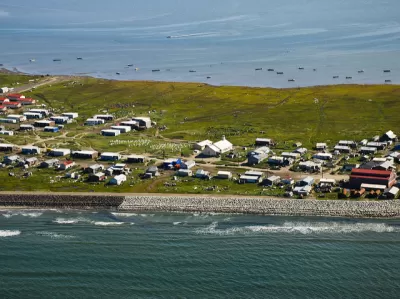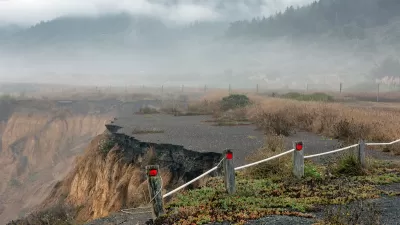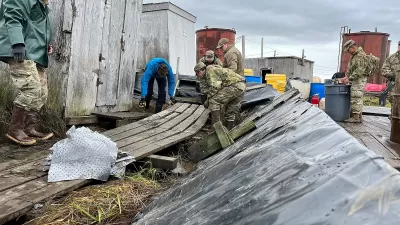From Alaska to Washington, climate change is real, and it’s here now, for indigenous tribes.

A feature article by Luna Reyna, published by Crosscut, takes a deep dive into the grave threats facing indigenous tribes in the Pacific Northwest—from Alaska to Washington—as a result of climate change and other environmental degradation.
Included in the feature-length story, Reyna shares news of a new documentary that spotlights the Yup’ik people of Alaska as they relocate due to rising seas.
On Earth Day, the documentary film Newtok, premiered to the public, raising awareness about potential climate refugees, the Yup’ik people of an Alaskan village called Newtok.
The Yup’ik are far from alone in being forced to relocate and facing an increasing number of environmental risks as a result of the planet's shifting climate.
Crosscut’s 2019 documentary, The Rising, spotlighted Quinault leaders’ efforts to relocate the villages of Taholah and Queets from their homelands, where over a thousand people face increased tsunami risk as the sea rises inch by inch, year by year.
Other tribes are facing other threats from climate change and other environmental impacts of society, like wildfires, melting permafrost, and declining salmon stock. As documented in the article, these indigenous people have been living in balance with their environment for time immemorial, and share none of the blame for their plight.
Meanwhile the country and the world have been slow to react, despite what the the United Nation’s International Panel on Climate Change (IPCC) describes as an incredibly short timeframe remaining for effective climate action. The federal Infrastructure Investment and Jobs Act (IIJA), approved in November 2021, allotted $46 million in funding for tribal communities to address the impacts of climate change as part of $466 million for the Bureau of Indian Affairs. That number is paltry compared to the total $500 billion in new spending enacted by the IIJA, or the tremendous need to eliminate the carbon emissions necessary to stave off the catastrophic effects of climate change.
FULL STORY: From WA to Alaska, coastal tribes face displacement with insufficient financial help

Alabama: Trump Terminates Settlements for Black Communities Harmed By Raw Sewage
Trump deemed the landmark civil rights agreement “illegal DEI and environmental justice policy.”

Planetizen Federal Action Tracker
A weekly monitor of how Trump’s orders and actions are impacting planners and planning in America.

Why Should We Subsidize Public Transportation?
Many public transit agencies face financial stress due to rising costs, declining fare revenue, and declining subsidies. Transit advocates must provide a strong business case for increasing public transit funding.

Understanding Road Diets
An explainer from Momentum highlights the advantages of reducing vehicle lanes in favor of more bike, transit, and pedestrian infrastructure.

New California Law Regulates Warehouse Pollution
A new law tightens building and emissions regulations for large distribution warehouses to mitigate air pollution and traffic in surrounding communities.

Phoenix Announces Opening Date for Light Rail Extension
The South Central extension will connect South Phoenix to downtown and other major hubs starting on June 7.
Urban Design for Planners 1: Software Tools
This six-course series explores essential urban design concepts using open source software and equips planners with the tools they need to participate fully in the urban design process.
Planning for Universal Design
Learn the tools for implementing Universal Design in planning regulations.
Caltrans
Smith Gee Studio
Institute for Housing and Urban Development Studies (IHS)
City of Grandview
Harvard GSD Executive Education
Toledo-Lucas County Plan Commissions
Salt Lake City
NYU Wagner Graduate School of Public Service





























